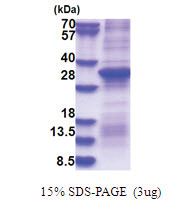Prothrombin (F2) (328-622, His-tag) Human Protein
CAT#: AR51483PU-S
Prothrombin (F2) (328-622, His-tag) human recombinant protein, 0.1 mg
Size: 500 ug
Other products for "F2"
Specifications
| Product Data | |
| Species | Human |
| Expression Host | E. coli |
| Expression cDNA Clone or AA Sequence |
MTFGSGEADC GLRPLFEKKS LEDKTERELL ESYIDGRIVE GSDAEIGMSP WQVMLFRKSP QELLCGASLI SDRWVLTAAH CLLYPPWDKN FTENDLLVRI GKHSRTRYER NIEKISMLEK IYIHPRYNWR ENLDRDIALM KLKKPVAFSD YIHPVCLPDR ETAASLLQAG YKGRVTGWGN LKETWTANVG KGQPSVLQVV NLPIVERPVC KDSTRIRITD NMFCAGYKPD EGKRGDACEG DSGGPFVMKS PFNNRWYQMG IVSWGEGCDR DGKYGFYTHV FRLKKWIQKV IDQFGE
|
| Tag | His-tag |
| Predicted MW | 33.9 kDa |
| Concentration | lot specific |
| Purity | >80% by SDS - PAGE |
| Presentation | Purified |
| Buffer | Presentation State: Purified State: Liquid purified protein Buffer System: 20 mM Tris-HCl buffer (pH 8.0) containing 0.4M Urea, 10% glycerol. |
| Preparation | Liquid purified protein |
| Protein Description | Recombinant human F2 protein was expressed in E.coli. |
| Storage | Store undiluted at 2-8°C for one week or (in aliquots) at -20°C to -80°C for longer. Avoid repeated freezing and thawing. |
| Stability | Shelf life: one year from despatch. |
| Reference Data | |
| RefSeq | NP_000497 |
| Locus ID | 2147 |
| UniProt ID | P00734 |
| Cytogenetics | 11p11.2 |
| Synonyms | PT; RPRGL2; THPH1 |
| Summary | This gene encodes the prothrombin protein (also known as coagulation factor II). This protein is proteolytically cleaved in multiple steps to form the activated serine protease thrombin. The activated thrombin enzyme plays an important role in thrombosis and hemostasis by converting fibrinogen to fibrin during blood clot formation, by stimulating platelet aggregation, and by activating additional coagulation factors. Thrombin also plays a role in cell proliferation, tissue repair, and angiogenesis as well as maintaining vascular integrity during development and postnatal life. Peptides derived from the C-terminus of this protein have antimicrobial activity against E. coli and P. aeruginosa. Mutations in this gene lead to various forms of thrombosis and dysprothrombinemia. Rapid increases in cytokine levels following coronavirus infections can dysregulate the coagulation cascade and produce thrombosis, compromised blood supply, and organ failure. [provided by RefSeq, May 2020] |
| Protein Families | Druggable Genome, Protease, Secreted Protein |
| Protein Pathways | Complement and coagulation cascades, Neuroactive ligand-receptor interaction, Regulation of actin cytoskeleton |
Documents
| FAQs |
| SDS |
Resources
Recombinant Protein Resources |
{0} Product Review(s)
0 Product Review(s)
Submit review
Be the first one to submit a review
Product Citations
*Delivery time may vary from web posted schedule. Occasional delays may occur due to unforeseen
complexities in the preparation of your product. International customers may expect an additional 1-2 weeks
in shipping.






























































































































































































































































 Germany
Germany
 Japan
Japan
 United Kingdom
United Kingdom
 China
China
